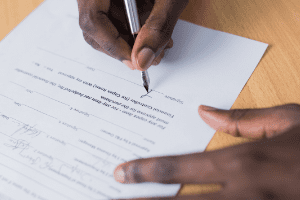How do I know if a prenuptial agreement is for me?
Signing a prenuptial agreement does not seem like a romantic or optimistic idea for many engaged couples. However, making decisions on how assets should be handled with your partner is a sensible way to start. It is critical to have a conversation about a prenuptial agreement with your future spouse if you think it is relevant to you.
What is a prenuptial agreement?
A prenuptial agreement, otherwise known as a “prenup”, is a contract between two people before marriage. It outlines asset ownership and describes how to divide the assets in the event of a divorce. If the marriage does not last, it usually covers property, income, and debts to cushion couples from financial surprises.
Once you get married, your assets may become marital property. In case of a divorce, each partner will legally have a claim on the assets. A prenup allows you to protect your assets from such an outcome even when they are not valuable or in your possession.
When should I get a prenup?
Prenups are likely to be signed when one partner has more wealth or is likely to obtain more property than the other. Although they are considered normal for celebrities and very wealthy people, anybody can get one.
Here are some instances when it may be a good idea to get a prenup:
- There is a wealth disparity between you and your fiance: Splitting assets equally during a divorce would affect you disproportionately if you brought more assets to the table than your spouse. A prenup protects the investments you could have accumulated for years before the wedding.
- You are expecting wealth in the future: A prenup can safeguard assets not currently in your possession when signing the contract, for instance, if you anticipate earning more than your partner from your career, investments, or an inheritance. In that case, it is a good idea to have a prenup to ensure your future assets are not part of marital property.
- You want to protect your business: Assets are more than money, property, investments, and other financial types. Your business forms part of the significant assets that a divorce might affect. A prenuptial agreement places your business outside your marital assets and safeguards its future.
- You need to protect an inheritance: You can sign a prenuptial agreement to protect a future estate that you expect to receive or to protect existing assets that you intend to pass on to someone else as an inheritance.
For example, if you are marrying or remarrying after having children, you may want to safeguard a portion of your wealth to provide for the children from the previous relationship. You can use the prenuptial agreement to separate these assets from those shared equally during a divorce.
5. There is a possible effect of international divorce laws: Divorce laws in your significant other’s home country may, in some instances, affect you if you marry a person from abroad. A prenuptial agreement will help you avoid losing assets due to laws from a foreign legal jurisdiction that may protect the distribution of assets in a divorce.
Is a prenuptial agreement legally binding?
Prenuptial agreements are not legally binding in the UK, but since the 2010 landmark case ruling of Radmacher vs Granatino, the courts are accepting them more as evidence of a couple’s intention.
Since then, prenuptial agreements carry significant authority in family courts. Similar rulings have been made more recently, but it has been found that prenups are more supported where a family law solicitor drafts and oversees the contract.
The Matrimonial Property Needs and Agreements report released by the Law Commission in 2014 recommends specific requirements for a prenuptial agreement to be enforceable.
- Contractual validity: You and your partner must agree freely and willingly to the prenup.
- You must draft the agreement by deed, and you both sign a statement that you understand the contract is enforceable and will partly withdraw the court’s freedom to give financial orders.
- You must sign the agreement more than 28 days before your civil partnership or marriage.
- You must have received disclosure of vital information about the financial situation before signing the agreement.
- Both of you must have received independent legal counsel before signing the contract.
- The agreement must not harm the children’s reasonable requirements.
The court will also check to ensure that upholding the terms of the agreement during divorce will not subject either of you to severe financial hardships.
Why should I have a prenup?
The law regards assets in marriage as “marital property”, and during a divorce, the court determines how to divide it fairly in case of a dispute. Although you may not want to think about it when you are in the happy stages of preparing to get married, a prenup lets you agree with your spouse on what happens to your assets in case of a divorce.
What are the benefits of getting a prenup?
The benefits of a prenup include:
- Protecting your assets: You may have heirlooms or inherited family property that you want to guard.
- It saves time and divorce costs: A plan to divide your assets may help you avoid an acrimonious and lengthy divorce.
- It allows you to potentially safeguard yourself from your partner’s debts with a clause limiting your liability, especially if your partner has outstanding borrowings.
- It provides an opportunity to understand your financial picture as a couple. You get the chance to be open about your finances before you marry.
- You can guard your business, including future profits.
- You can provide for your children from a former marriage.
Does a prenup actually protect me?

Here are ways in which a prenup can protect you:
- It protects you from accrued debt: You do not have to share liability for a person’s debt.
- It is helpful in second marriages: Many people sign prenups before entering a second marriage because they are likely to have acquired a substantial amount of assets. They also want to ensure that their children have a share of their wealth after the divorce.
3. A prenup takes precedence over a Will: An updated Will should have the same information as the prenup. However, if it does not, courts tend to rule in favour of prenups, provided you negotiate thoroughly with your partner.
How can we help?
At Ackroyd Legal, we understand that drafting a prenup can be daunting, but viewing the process as an opportunity to have conversations about money before committing is critical.
Contact one of our lawyers today on 020 3058 3363 for further advice on drafting your prenup.





